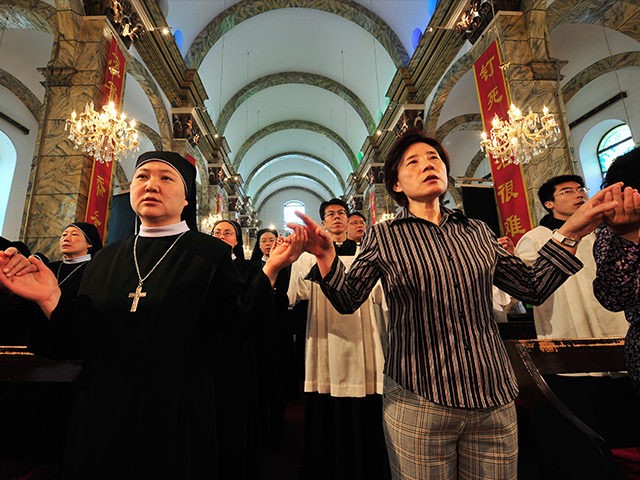Myanmar Cardinal Charles Bo has urged Christians around the world to unite in praying for the Chinese people during the week of May 23-30.
“Since the start of the Covid-19 pandemic, the peoples of China have faced increasing challenges, which impact us all,” declared Cardinal Bo, who is president of the Federation of Asian Bishops’ Conferences. “It is right that we should pray not only for the Church but for all persons in the People’s Republic of China.”
“We should ask Our Lady of Sheshan to protect all humanity and therefore the dignity of each and every person in China,” added the cardinal, who leads the archdiocese of Yangon.
Cardinal Bo has made a point of clearly distinguishing between the Chinese people and the Chinese Communist Party (CCP), which he has called “despotic” and “impossible.”
In April, 2020, Bo wrote a stern letter insisting that the CCP has “primary responsibility” for the global coronavirus pandemic and owes the world “compensation for the destruction it has caused.”
There is “one government that has primary responsibility for what it has done and what it has failed to do, and that is the CCP regime in Beijing,” Bo wrote.
“Let me be clear — it is the CCP that has been responsible, not the people of China, and no one should respond to this crisis with racial hatred toward the Chinese,” the cardinal declared. “Indeed, the Chinese people were the first victims of this virus and have long been the primary victims of their repressive regime.”
“But it is the repression, the lies and the corruption of the CCP that are responsible,” he says.
Bo denounced “the negligent attitude shown by China, especially its despotic Chinese Communist Party (CCP) led by its strongman Xi Jinping,” adding that “China is legally responsible for Covid-19 and claims could be made in the trillions of dollars.”
“Lies and propaganda have put millions of lives around the world in danger,” he said, while the CCP’s conduct in the coronavirus pandemic “is symptomatic of its increasingly repressive nature,” a phenomenon revealed in its “intense crackdown” on freedom of expression and freedom of religion.
CCP despotism has gone beyond the borders of mainland China, he noted, and Hong Kong itself, “once one of Asia’s most open cities, has seen its freedoms, human rights and the rule of law dramatically eroded,” he added.
In his prayer campaign, the cardinal has reasserted his love and appreciation for the people of China.
“In proposing this Week of Prayer, I am expressing my love for the peoples of China, my respect for their ancient civilization and extraordinary economic growth, and my hopes that as it continues to rise as a global power, it may become a force for good and a protector of the rights of the most vulnerable and marginalized in the world,” he declared.
The Chinese people hunger for “a happiness that only God can satisfy, the hunger for dignity,” he wrote. “I am calling for prayer for each person in China, that they may seek and realize the full measure of happiness that our Creator has given to them.”
“Many parts of the world are currently challenged, including my own country of Myanmar at this time, but in a spirit of solidarity it is right to focus not only on our own challenges but to pray also for others, in the clear knowledge that their well-being is closely linked to ours,” he stated.
Cardinal Bo’s summons to pray for China has been taken up by a coalition of lay Christians from six continents who have joined together to promote the cardinal’s initiative.
They have started a website called Global Prayer for China, which spreads the message of the prayer campaign as well as offering resources on the difficult situation in China for people of faith.
One such article, titled “The Chinese Communist Party’s War on Churches,” documents the “severe repression” suffered by China’s Christian population.
“The current religious crackdown is demonstrably the harshest and most comprehensive experienced by the Chinese Church since Mao Zedong’s rule,” the essay states. “Across China, both government-approved and underground churches are deeply impacted and may even be existentially threatened.”

COMMENTS
Please let us know if you're having issues with commenting.